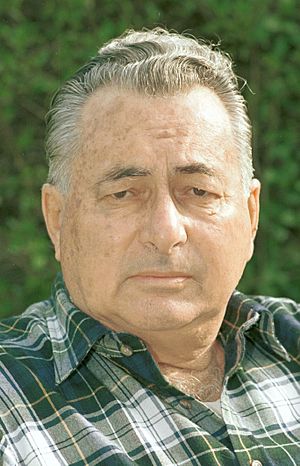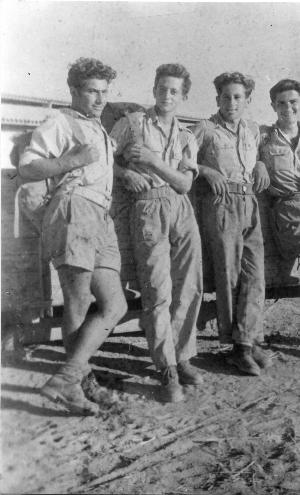Moshe Shamir facts for kids
Quick facts for kids
Moshe Shamir
|
|
|---|---|
 |
|
| Faction represented in the Knesset | |
| 1977–1979 | Likud |
| 1979 | Independent |
| 1979–1981 | Tehiya-Bnai |
| Personal details | |
| Born | 15 September 1921 Safed, Mandatory Palestine |
| Died | 21 August 2004 (aged 82) |
Moshe Shamir (Hebrew: משה שמיר; 15 September 1921 – 20 August 2004) was a famous Israeli writer, playwright, and public figure. He wrote many books and plays. One of his plays became a well-known Israeli movie called He Walked Through the Fields.
Contents
Who Was Moshe Shamir?
Moshe Shamir was born in Safed, a city in what was then called Mandatory Palestine. He grew up and went to school in Tel Aviv. He finished high school at the Herzliya Hebrew High School.
His Early Life and Army Days
During the 1948 Arab-Israeli War, Moshe Shamir served in a special army unit called Palmach. He started his career in politics as a leader in a youth movement called Hashomer Hatzair. From 1939 to 1941, he helped edit their newspaper, Al Ha-Homa.
Later, from 1944 to 1946, he lived and worked on a kibbutz (a community farm) called Mishmar HaEmek. He also helped start and edit the official newspaper for the Israel Defense Forces (Israel's army) called Bamahane ("In the Camp"). He worked there from 1947 to 1950. In the 1950s, he was part of the team that edited the newspaper Maariv. He also edited its section about books and literature.
Becoming a Writer and Journalist
Moshe Shamir started writing stories when he was young. His writing quickly got attention. He often wrote about political issues, which sometimes caused disagreements. For example, some people in his political movement didn't like what they saw as "wrong ideas" in his early stories. Because of these disagreements, he decided to leave his kibbutz in 1947.
Famous Books and Plays
His first story, published in 1940, was about Abraham and the binding of Isaac from the Bible. It appeared in a youth newspaper. In 1947, he wrote a novel called He Walked Through the Fields. This book was very important because it became the first play performed in the new State of Israel. The main character was a "Sabra," which is a term for someone born in Israel. This book won the Ussishkin Prize. It was also made into a movie.
In 1947, he became the main editor of the Haganah newspaper, which later became the Israel Defense Forces newspaper Bamahane. He was later asked to leave this job by David Ben-Gurion, who was Israel's first Prime Minister. This happened because Shamir published an article about a celebration for the end of the Palmach army unit. After this, he often caused public discussions with his writings and opinions.
One of his most famous books is With His Own Hands: Elik's Story (1951). It is about his brother Elik, who died in the War of Independence. This book became a symbol of that war. Elik's Story was translated into English and adapted for radio and even television. It sold over 150,000 copies and became a book studied in schools.
Shamir also wrote books about his own life and family. Under the Sun (1950) and That You Are Naked (1959) are about his experiences in the 1930s and 1940s. He wrote With His Own Heart about his father and Not Far From the Tree about his family's history.
A Children's Book
Besides his book The King of Flesh and Blood, his most translated book was a children's book called The Fifth Wheel (1961). It tells the adventures of a kibbutz worker who goes to pick up a tractor from the port. On his journey, he faces many fun obstacles and adventures.
Moshe Shamir also wrote poems, but he was mostly known for his prose (stories and novels). He wrote more than 25 books during his life. He passed away in Rishon LeZion at the age of 83.
His Political Journey
Moshe Shamir was active in a political party called Mapam. After the Six-Day War in 1967, his political views changed. He became one of the people who started the Movement for Greater Israel. This group believed in keeping all the land Israel had gained in the war. He was elected to the Knesset (Israel's parliament) in 1977 as part of the Likud party.
He was also one of the founders of a group called "Bnai." This group was against the Camp David Accords (1978), which were peace agreements between Israel and Egypt. In late 1979, after the peace treaty was signed, he and another Knesset member, Geula Cohen, left Likud. They started a new party called Tehiya. Moshe Shamir strongly supported building new communities in the West Bank after it was captured.
His change from left-wing to right-wing politics had an impact on him. Some main literary groups did not allow him to be a member anymore.
Awards and Recognition
Moshe Shamir received several important awards for his writing:
- In 1950, he won the Ussishkin Prize.
- In 1953, he received the Brenner Prize.
- In 1955, he was awarded the Bialik Prize for literature.
- In 1988, he received the highest honor, the Israel Prize, for his contributions to Hebrew literature.
Books You Can Read
Here are some of Moshe Shamir's books that have been translated into English:
- He Walked Through the Fields (1959, as a play), originally Hu Halach Ba-Sadot (1947)
- Taking the Mountains (1948, play)
- With His Own Hands (1970), originally Be-Mo Yadav (1951)
- The King of Flesh and Blood (1958), originally Melech Basar Va-Dam (1954)
- David's Stranger (1965), also called The Hittite Must Die (1978), originally Kivsat Ha-Rash (1956)
- The Fifth Wheel (1961), originally Ha-Galgal Ha-Hamishi (1961)
- My Life With Ishmael (1970, a political autobiography), originally Hayai Im Ishmael (1968)
See Also
 In Spanish: Moshe Shamir para niños
In Spanish: Moshe Shamir para niños
- List of Bialik Prize recipients
- List of Israel Prize recipients
 | Emma Amos |
 | Edward Mitchell Bannister |
 | Larry D. Alexander |
 | Ernie Barnes |


